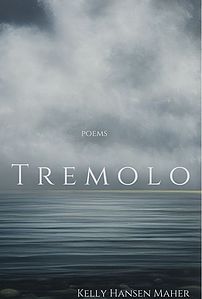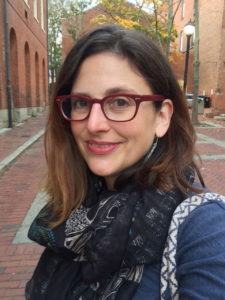 Book Title, Press, Year of Publication:
Book Title, Press, Year of Publication:
Tremolo, Tinderbox Editions, 2016.
Synopsis: Tremolo is an autobiographical book that thematically explores my experience with recurrent pregnancy losses, and the grief and confusion that accompanied them. Although this is the subject matter of the book, the organizing principle is to cycle through different kinds of sound. The sound imagery pulls from a variety of sources—song, sonogram, birdcall, voices, silence, and a yearnful (to borrow from Keats), deep listening on the part of the speaker.
What do you think makes your book (or any book) a “project book”?
The term “project book” refers to an author’s preoccupation or obsession writ long. For me, there’s another aspect, which has to do with conceptualizing the book as a whole—that is, a single work, versus a collection of independent poems. For example, when I began to write Tremolo, it wasn’t that I was thinking “I’m working on a project book,” but I was sure that I wanted a reader to absorb the book in its entirety, and to page through from cover to cover. I wanted to convey narrative over many poems, and to let story arise from the experience of repetition, variation, or aggregation. Because my subject matter in Tremolo was about recurring loss, recurring attempt, circles of grief, and vast silences, I hoped to have a layering of event and resonance, so that the reader might have the satisfaction of a narrative experience, but over real time, and with lyric—not narrative—as the central mode of any given poem.
Why this subject (or constraint)?
I was consumed. Over several years of pregnancy losses, as well as the birth of one live and thriving child, this subject, this wilderness, was the only subject that had real urgency for me as a poet. It took time to figure out the constraints that organized the book. What threads would pull the reader from page to page? Once underway, I became consumed by the challenge of the book itself. It felt good, and like good work to be doing.
Are you comfortable with the term “project book”?
Oh, I guess I’m okay with it—although I wonder if it’s a fad phrase? People talk about how “project books” have become so popular among publishers and poets in recent years, and so then there’s this backlash from poets who want to defend the artistic sovereignty of the individual poem. I’d love it if we could talk about poetry “books,” versus poetry “collections,” and leave out the whole “project” aspect; but we don’t distinguish approaches to poetry this way, as we do in fiction and creative nonfiction.
At any point did you feel you were including (or were tempted to include) weaker poems in service of the project’s overall needs? This is a risk, and a common critique, of many project books. How did you deal with this?
I suppose, like any long-form writing that goes through many drafts, I was always trying to move from weaker to stronger poems. So, if a poem seemed weak to me, I either dropped it or revised it until I was satisfied. I wanted each poem, or sub-poem, to be doing something unique. If a poem seemed to be duplicating the heart of another poem, I asked myself whether it was really needed. This was tricky, because one of my organizing principles, as well as a poetic concern, was repetition. But I didn’t want to repeat a poem’s crux, even as I sought to repeat sound or form, and even as I depicted very similar cycles and events.
Do you have a sense of whether the fact that this is a project book helped position it to find publication more easily? Has it helped you find readers?
I don’t necessarily think that it helped me find publication. As for audience, I do have a sense that it helped me find readers—namely, those who are personally curious about, or have experienced, miscarriage or stillbirth. On the other hand, the project’s subject has probably shut out so many more readers—those who have little interest in pregnancy loss, or who are turned off by the idea that the book might be a long, sentimental confession. After all, this is a first book, and readers don’t know me. But I did my best to interrogate all the broader subjects that we turn to poetry for—loss, sorrow, the unsaid, the desire for knowledge, connection with nature. Yet the singular nature of a project book doesn’t necessarily promise this.
After completing a project, how did you transition into writing something new? What are you working on now? Another project?
Actually, yes, I am working on another project—a few others, as a matter of fact. It’s probably the nature of my intellect and aesthetic to think across time and discipline, to want to illustrate connections. I still seem to be drawn to large subject matter, which I want to explore from many angles. I love that the book, as a whole, offers an overarching form, and I want that design to speak to something or amplify something. I guess this interest is another kind of obsession of mine; one I love to think of as artistic holography. Some poets get really, really interested in brevity, or in a single aspect of craft—the line break, or pronouns, or compression. I might get into those aspects as well, but then I start to wonder, and need to explore, how those aspects serve the whole, and before I know it, I’ve got another project on my hands.
My current poetry project has to do with unearthing the connections between three things: my current home in the Iowa farmland, née prairie; the Minnesota housing development I lived in as a kid, which skirted a working municipal landfill; and the recent loss of my father, who retired from a life with the railroad, then died of lung cancer.
You also asked about transitioning, and what’s funny is that moving into a second book-length work has me considering the possibilities of how the two books might speak to one another. Is it a kind of series, for example? (See? The obsession strikes again!) One thing I think about, even at this early stage, is that Tremolo was my water book, and this new one is my fire book.
What advice can you offer other writers, particularly emerging writers or poetry students who may be using the project book as a guiding principle for their own work?
My advice is to first be clear about whether you are actually working with a single, book-length project, or whether you might instead be exploring a cycle or sequence. Are you forcing it? Even if your eye is on the full-length manuscript, maybe you have a sequence or suite that is better off as a part or section within a collection. If you get to the point where you are feeling the need to come up with poems to fill a page limit for a full-length manuscript, for example, you’re likely either not really working on a project book, or you haven’t explored your core theme from enough angles.
If you’re sure you have a full-on project book going, I suggest you try thinking about what the whole of the project conveys. Ask yourself: what experience can a reader have by encountering this material as a full-book treatment that they would not get out of a collection, even a thematic collection? What is your concept for the book? Considering this can spark all sorts of possibilities with variation and image.


